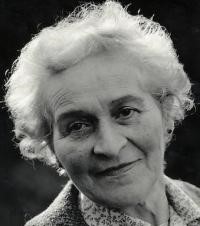Last of the London Hungarians
mainAnyone remember Edith Vogel? She was one of a clutch of Solti compatriots who taught two generations of Londoners how to play piano by proper principles.
Edith died, aged 80, in 1992.
Andrew Bottrill, professor of piano at the Guildhall School of Music and Drama, has published this lovely reminiscence.






Thank you, Norman, for featuring Andrew’s wonderful article, from the Pianists From The Past series on my blog.
My pleasure… it’s a great series. N
I remember her Schumann performances broadcast by Radio 3 in the early 1980s. The Fantasie Op.17 was particularly memorable. I was surprised that she wasn’t more widely known as a performer.
This is a beautifully written reminiscence of a truly wonderful musician and pianist. Her BBC recordings attest to that.
I had the privilege of having lessons with my piano trio from her. She was very demanding but it was absolutely worth it as we always left the room better musicians and players than when we walked in.
Norman, Edith (whom I got to know through Hans Keller in the early 1980s) was not Hungarian: she was born in Czernowitz, in Bessarabia, which was indeed part of the Austro-Hungarian Empire, but that’s not the same thing. (Czernowitz is now Chernivtsi, in the Bukovina, in western Ukraine.) At the time I got to know her, she was one of the six greatest living pianists, alongside Gould, Horszowski, Horowitz, Ogdon and Stevenson, all of whom I could identify by ear. Her playing of the Viennese classics was the most penetratingly insightful of any pianist I was aware of. She was alert to substrata in the music in the way we now look for hidden meaning in Shostakovich’s works: for example, she pointed out to me a quotation in the slow movement of Schubert D959 in A major from a song where a soldier sings of going off to war (I can’t remember which song, I’m afraid). She could be refreshingly abrupt: she was once asked, after a Brendel concert, if she would like to be introduced to him and answered: ‘No, I don’t need to — I have heard him!’
“One of the six greatest living pianists?”
Greater than Richter? Greater than Gilels or Arrau?
What nonsense !!
Alexander, Martin’s implied definition of “greatness” is something to do with being able to “recognise” the playing. Vogel’s musical personality is distinctive and unique, as is that of the other five pianists he cites. He goes on to say that she was “penetratingly insightful” with a sensitivity to “substrata” of meaning in the music she performed. I think it’s completely fine to have other criteria by which to measure the status of a performer, but Martin is being clear and articulate on the topic. I don’t see reason to dismiss what he says as nonsense, however many alternative names that could be listed.
Many thanks for your thoughtful and interesting response. Yes, the topic of ‘identity of origin’ is fraught with difficulty. When Vogel found out about her birthplace (as you correctly identify it) I remember she was overjoyed that it was not Austria. She didn’t attach herself to any particular group by nation or ethnicity.
On a BBC cd there is a magnificent studio recording of Beethoven’s ‘Hammerklavier’ from Edith Vogel. Maria Donska – another name to conjure with.
I studied piano with Andrew whilst at London University for a couple of years. I know he was a great disciple of Edith Vogel’s whilst a student at the GSMD. I am pleased that he passed on some of her excellent methods to me.
I had the misfortune of being one of her students.
She was toxic, irrational, destructive, and in my opinion, unhinged.
Her teaching “methods” were nonsensical, not to say damaging.
She should never have been allowed anywhere near a teaching studio.
Someone I wish I had never crossed paths with.
Alexander, Having had the privilege of meeting Edith on several occasions and seeing and hearing her in action as a teacher I can only conclude your poisonous comment says more about you than this very fine pianist and human being. I only hope you are ashamed.
There’s a huge difference between meeting someone and studying with them.
I therefore think I am far better qualified to pass judgement.
Besides which, my comment got three likes which ought to tell you something.
So no, I am certainly not ashamed of my comments.